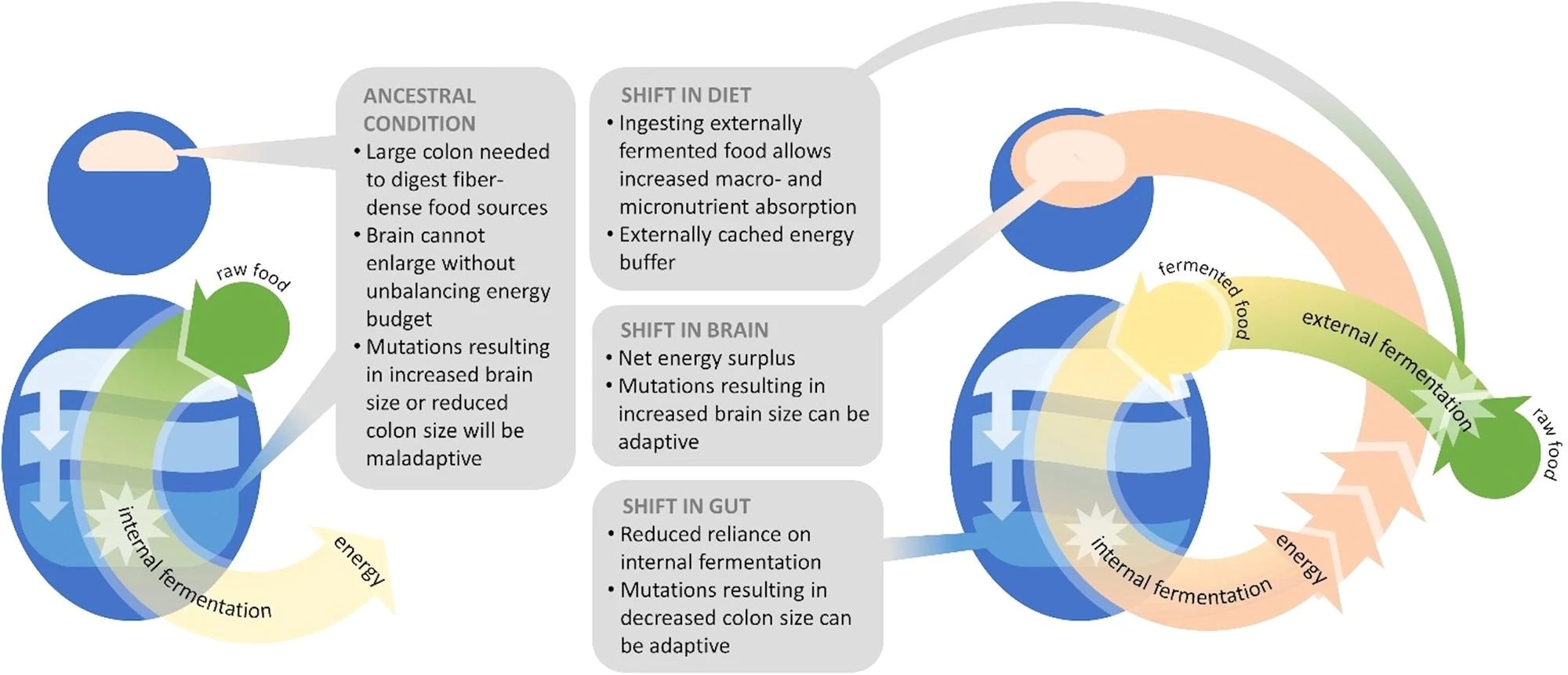In a review published in the journal Communications Biology, researchers in the United States of America described the potential role and benefits of externally fermented foods in triggering the expansion of the hominid brain. They further discussed the explanatory power of their “external fermentation hypothesis” and surveyed relevant food practices across human cultures.
Image Credit: Busker909 / Shutterstock
Background
The human brain volume increased three-fold over the course of evolution. Although the expansion of the brain has been studied with respect to its extent and timelines, the mechanisms underlying this modification are poorly understood. Various hypotheses have been proposed in this regard. The “expensive tissue hypothesis” suggests that enlargement of the human brain required reallocating resources from the digestive system. This is evident in the fact that the human gastrointestinal tract is 60% smaller as compared to that of primates. However, given that the gut itself is responsible for absorbing nutrients, other studies suggested that a larger brain size could support net fitness only if energy costs were adjusted by dietary changes, such as increasing the consumption of meat or tubers. Another dietary modification could have been cooking, which provided appropriate calories and nutrition to support an increased brain size and reduced gut size. However, the controlled use of fire would require a fair level of cognitive capabilities, which may not be present in hominins with a lower brain-to-body ratio.
Given the limitations of the above hypotheses, there remains a gap in our understanding of the triggers of initial encephalization. Addressing this need, researchers in the present review proposed the “external fermentation hypothesis” and discussed the evidence supporting it.
Internal fermentation
In the human gastrointestinal tract, especially the colon, symbiotic bacteria break down organic food matter into nutrients such as short-chain fatty acids, a process called internal fermentation. It provides additional energy from undigested fiber, improves the absorption of vitamins and minerals, and also enables the breakdown of anti-nutritional factors (ANFs) present in food.
External fermentation and its role in brain expansion
On the other hand, external fermentation is when the breakdown of food is brought about by bacteria in the environment or on the food surface. External fermentation provides benefits similar to internal fermentation. It improves the host’s gut health by contributing to its microflora, improves the absorption of nutrients, enhances the bioavailability of nutrients by breaking down ANFs, and helps convert poisonous substances into edible material. Additionally, external fermentation improves the host’s immunity as ingested probiotic bacteria colonize the gut and prevent the colonization of pathogens in the area.
 A diagrammatic representation of the External Fermentation Hypothesis.
A diagrammatic representation of the External Fermentation Hypothesis.
According to the researchers, the colon experienced a significant 74% reduction over evolution, indicating a reduced need to break down plant-derived food. The external fermentation hypothesis states that this change could potentially be an adaptation following the ingestion of externally fermented food.
The feasibility of external fermentation was discussed further, hypothesizing that early hominins may have carried and stored food, unintentionally initiating external fermentation. Over time, this practice may have evolved into a culturally reinforced phenomenon, contributing to brain expansion and cognitive development in hominins.
Explanatory advantages of the present hypothesis over others
Several explanatory advantages of the external fermentation hypothesis have been identified over previous hypotheses. Compared to dietary modifications such as tuber-harvesting, meat-eating, and cooking, consuming externally fermented foods requires much lower cognitive abilities. Fermented foods confer all the benefits of cooked food while needing no special planning, social coordination, or attention. Fermentation appears to be more likely to be discovered than, for example, the fire needed for cooking. Further, fires are required to be maintained actively, while fermentation is a passive process. Fermentation is also a simpler alternative to other intensive food preservation techniques. The researchers suggest that hominins with lower cognitive abilities and smaller brains may have accomplished fermentation more easily than other methods.
Current fermentation practices
The fermentation technology of today is highly evolved and widespread. People across the world manage to ferment all kinds of food from varied sources over different climatic conditions and timescales. The researchers collated a list of such examples and utilized them as evidence to support fermentation’s plausibility, cultural acceptability, and universality.
Testing the hypothesis
To test the external fermentation hypothesis, the researchers suggest various avenues, including examining genetic shifts related to metabolic, digestive, and immune processes affected by external fermentation, analyzing olfactory receptor genes for potential positive selection related to fermented food detection, and investigating shifts in the human microbiome compared to ape relatives. They emphasize the need for empirical research, including microbiological studies, comparative analyses, and genetic and genomic investigations, to support or negate their hypothesis.
Conclusion
The researchers in the present review propose the “external fermentation hypothesis,” suggesting that adopting fermentation technology by early hominins was a key mechanism for human brain expansion and gut reduction. They suggest that the conversion of gut fermentation into an external practice may have been a significant innovation, setting the metabolic conditions for the selection of brain expansion. The present review offers novel insights into the evolution of the human diet and the anatomy of the gut and brain, inviting commentary and experimental tests to further validate the hypothesis.








